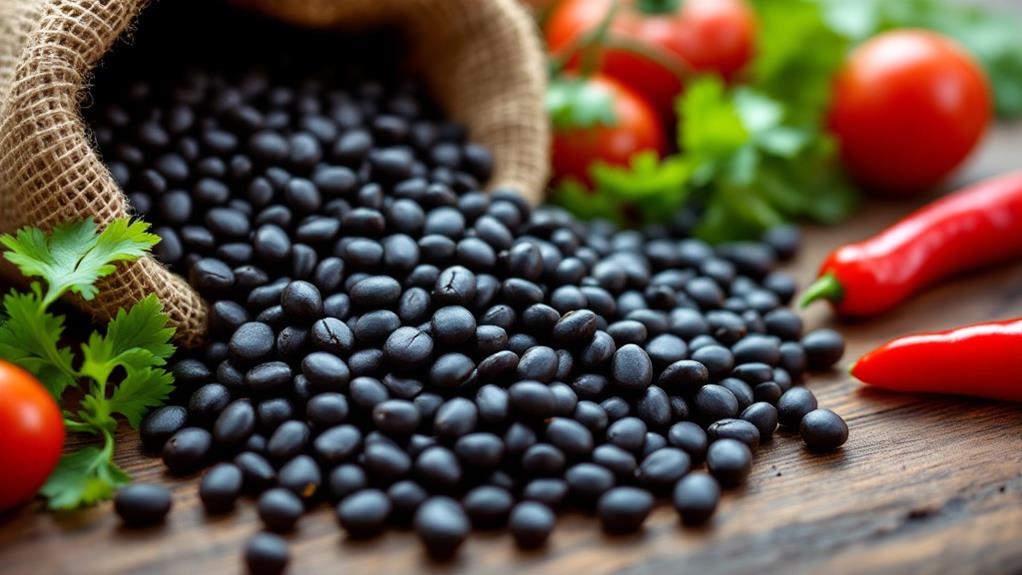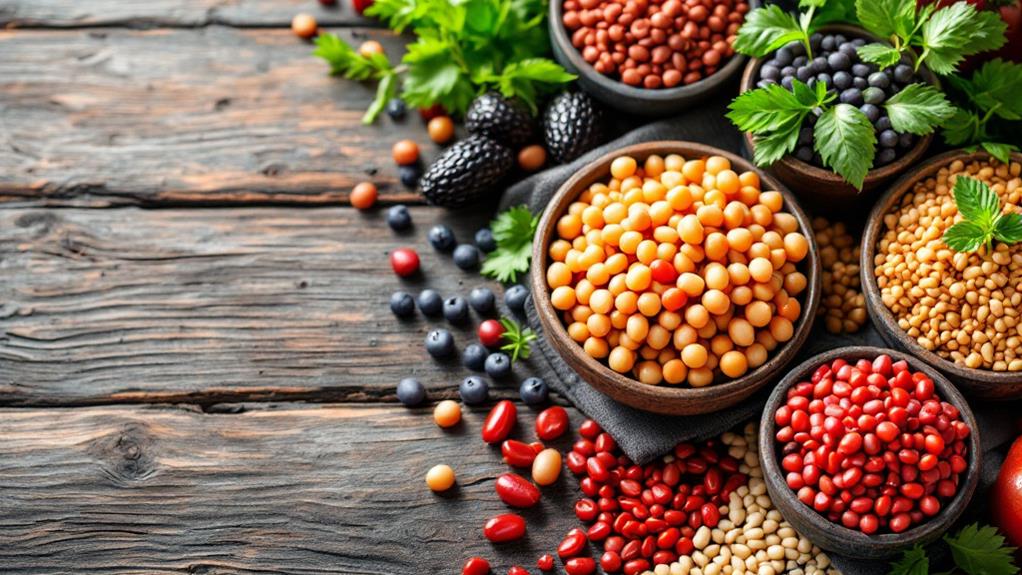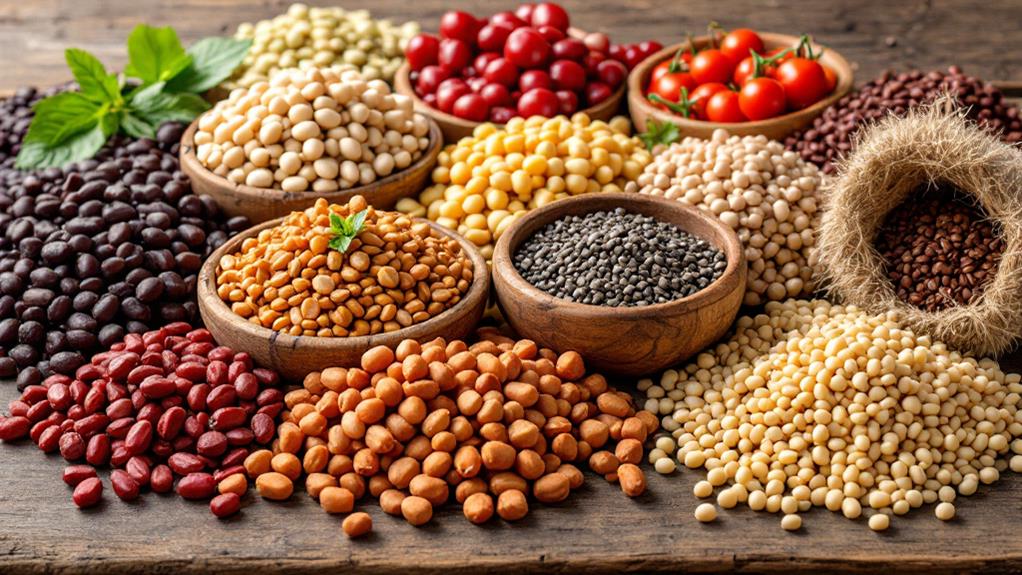Top Health Benefits of Common Beans: Nutritional Powerhouses in Your Diet
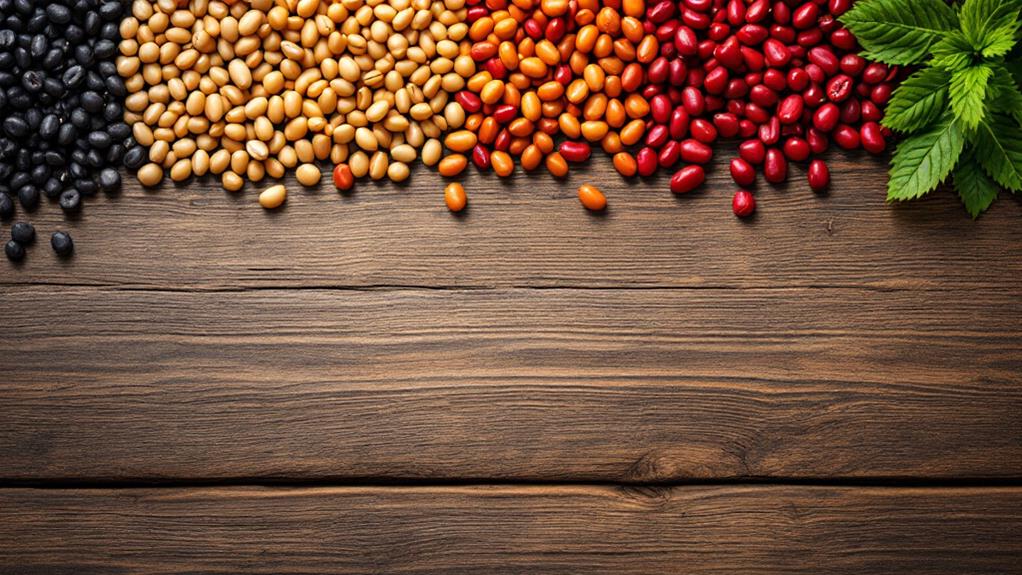
You'll find that common beans are a nutritional powerhouse, offering numerous health benefits. They're low in calories but packed with protein and fiber, making them great for digestion and satiety. Their rich micronutrient content, including iron and folate, supports essential body functions. Heart health gets a lift too, as beans help lower cholesterol and manage blood pressure. They have a low glycemic index, which aids in stabilizing blood sugar levels and reducing type 2 diabetes risk. Regardless of whether in salads or stews, beans add flavor and nutrients, and as you investigate further, you'll uncover even more reasons to enjoy them.
Nutritional Profile of Beans
When you're looking to enhance your diet, understanding the nutritional profile of beans can be remarkably advantageous. As nutritional powerhouses, beans are a low-calorie food, providing about 100 calories per half cup of cooked beans. This makes them an excellent choice for weight management. They're packed with protein, offering 6-9 grams per serving, with soybeans even providing complete protein. This protein content is vital for muscle repair and growth.
Beans are also rich in dietary fiber, with around 7 grams per 100 calories. This high fiber content supports your digestive health by promoting regular bowel movements and helps regulate blood sugar levels, making beans a smart choice for those monitoring their glucose intake. Furthermore, they are loaded with necessary micronutrients like iron, magnesium, potassium, and folate, contributing to overall health and wellness.
Moreover, beans are antioxidant-rich, containing polyphenols that combat oxidative stress. Varieties such as red beans rank among the top 50 antioxidant-rich foods, supporting your body's defenses against free radicals. Regardless of your aim to enhance your nutrient intake or maintain a healthy weight, incorporating beans into your meals can be a delicious and impactful choice.
Heart Health Benefits
Beans are a heart's best friend. Including them in your diet can considerably improve heart health. They're loaded with high fiber, averaging 15 grams per cup, which helps lower cholesterol levels. This reduction in cholesterol is fundamental for maintaining robust cardiovascular health and decreasing the risk of heart disease. Additionally, beans are naturally low-fat and contain no cholesterol, making them a heart-healthy protein alternative that supports a balanced diet.
Red beans, in particular, are a powerhouse for your heart. Just one cup provides a third of your daily folate needs. Folate is essential for reducing homocysteine levels, a marker linked to a higher risk of heart attack and stroke. By keeping these levels in check, you're actively protecting your heart.
Beans also aid in managing blood pressure, thanks to their nutrient density rich in potassium and magnesium. These nutrients are crucial for maintaining healthy blood pressure and supporting heart muscle function. Regular consumption of beans can effectively reduce hypertension, improving overall heart function. By making beans a staple in your meals, you're taking considerable steps towards better cardiovascular health and protecting your heart for the long haul.
Impact on Blood Sugar
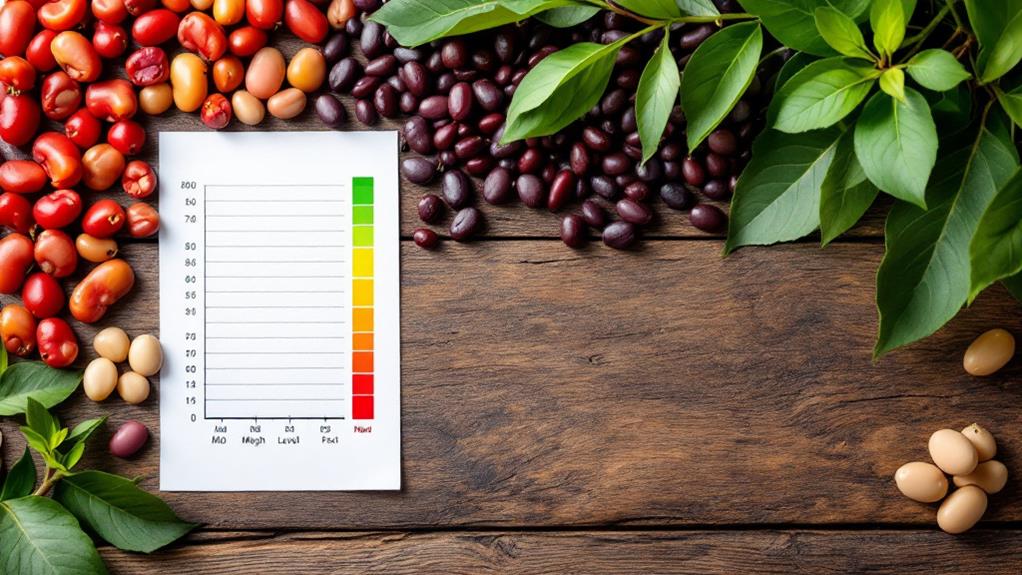
Beans' ability to regulate blood sugar levels is a blessing for anyone concerned about managing diabetes or maintaining steady energy levels. Kidney and black beans are particularly effective due to their low glycemic index, which slows sugar absorption and keeps your blood sugar levels stable after meals. This stability is essential for preventing post-meal spikes, which can be problematic for those with diabetes.
The high fiber content in beans plays a significant role in this regulation. With 13.1g of fiber in kidney beans and 15g in black beans per cup, your digestion slows down, allowing for gradual sugar absorption. This means less strain on your body's insulin production, which can improve insulin sensitivity over time. Importantly, chickpeas have shown to improve insulin sensitivity in studies, further supporting the beneficial effects of beans on blood sugar.
Including beans in your diet can also help reduce the risk of type 2 diabetes. Their combination of fiber and protein promotes satiety, enabling you to manage total caloric intake more effectively. Moreover, lentils, another legume, have been shown to stabilize blood sugar and lower LDL cholesterol levels, making them a valuable supplement for those concerned about diabetes.
Boosting Digestive Health
Beyond their impressive impact on blood sugar levels, common beans also offer significant benefits for digestive health. By incorporating beans into your diet, you're embracing an excellent source of dietary fiber, with varieties like navy beans providing up to 19.1 grams per cup. This fiber is essential for promoting regular bowel movements and enhancing general digestive health. The soluble fiber in beans plays a crucial role in slowing digestion, which not only stabilizes blood sugar levels but also supports gut health by nurturing beneficial gut bacteria.
Consider these benefits when adding beans to your diet:
- Combat Constipation: The high fiber content helps reduce constipation symptoms and increases the frequency of bowel movements.
- Improve Gut Health: Soluble fiber fosters a healthy gut environment, supporting beneficial bacteria.
- Enhance Satiety: Fiber in beans increases feelings of fullness, aiding in proper waste breakdown and elimination.
- Reduce Digestive Disorders: Regular bean consumption is linked to a lower risk of issues like diverticulitis due to their nutrient density.
Incorporating beans regularly can lead to noticeable improvements in your digestive health, helping you feel less bloated and more comfortable in general. Regardless of your aim for better digestion or simply seeking nutrient-dense foods, beans should be a staple in your diet.
Rich in Essential Nutrients
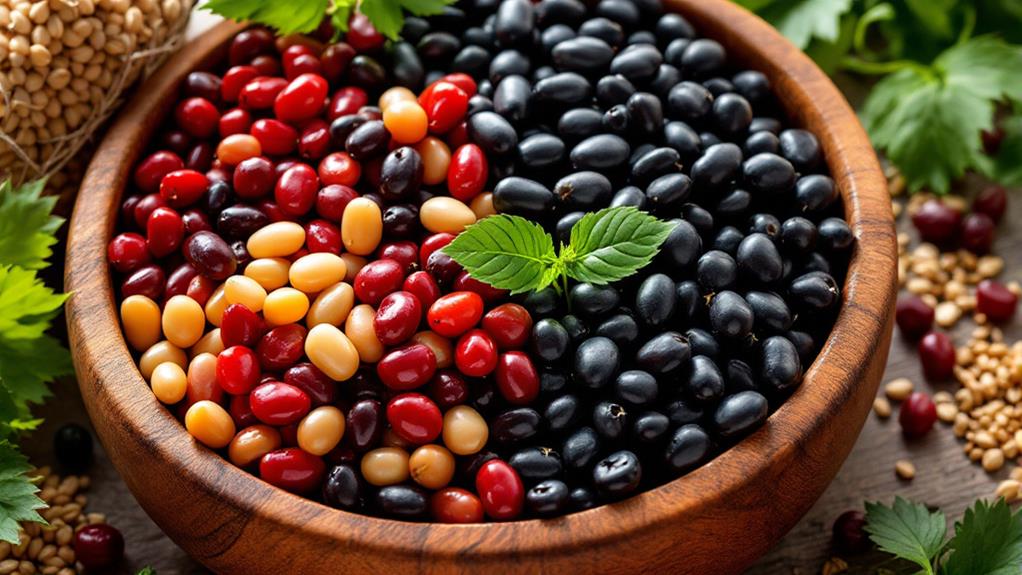
Packed with important nutrients, common beans are a powerhouse of health benefits you shouldn't overlook. These beans, including kidney and black varieties, are rich in protein, supplying about 15 grams per cup. This makes them a fantastic plant-based protein source, necessary for maintaining muscle and overall health. In addition, common beans are high in dietary fiber, with cooked navy beans offering around 19 grams per cup. This fiber content supports your digestive health and helps keep your blood sugar levels stable.
Beans are also bursting with significant vitamins and minerals. For example, a cup of cooked lentils provides 90% of your daily folate needs, critical for red blood cell production. Moreover, beans are low-fat and cholesterol-free, contributing to heart health. With only about 1 gram of total fat in a cup of pinto beans, they make an excellent heart-healthy choice.
Furthermore, common beans are packed with antioxidants. Red beans, in particular, rank among the top 50 antioxidant-rich foods. These antioxidants help combat oxidative stress in your body, protecting your cells and supporting long-term health. Integrating common beans into your diet offers a rich array of nutrients for your well-being.
Incorporating Beans Into Meals
While common beans offer a wealth of nutrients, knowing how to incorporate them into your meals can improve their benefits. By incorporating these legumes, you can greatly increase your protein and fiber intake, vital for digestive health and complete nutrition. For instance, black beans and soybeans are excellent meat substitutes with up to 31.3g of protein per cup. Adding beans to your salads not only enriches flavor and texture but also raises the fiber content, promoting satiety and digestive health.
Consider these ideas for incorporating beans into your meals:
- Salads: Toss in navy beans for a fiber increase, offering 19.1g per cup, improving both flavor and digestive health.
- Soups and Stews: Use lentils as a base for hearty, nutritious meals. One cup delivers 17.9g of protein and 15.6g of fiber.
- Snacks: Try hummus made from chickpeas. It's a nutrient-dense snack with 14.5g of protein per cup, perfect with veggies.
- Gradual Introduction: Start with small amounts of beans in meals to allow your body to adjust to their high fiber content, reducing potential digestive discomfort.
Incorporating beans into your diet can transform your meals into nutritional powerhouses.
Considerations and Precautions
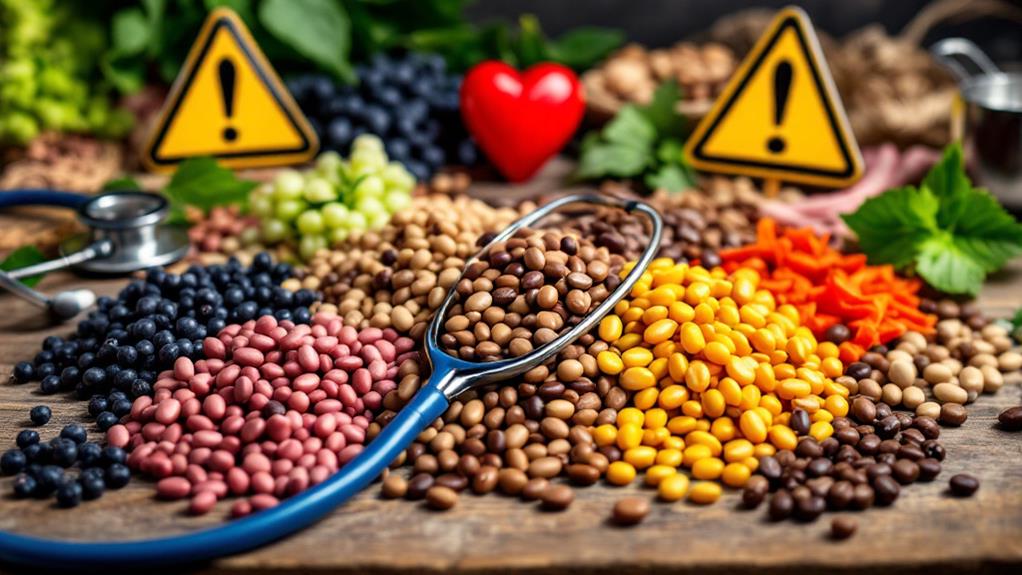
When adding beans to your diet, it's vital to be aware of potential considerations and precautions. You might experience digestive discomfort, like gas and bloating, especially if you're not used to high-fiber foods. To ease this, slowly introduce beans into your meals. Moreover, be cautious of allergies, as they can pose serious health risks. If you're allergic to legumes, such as peanuts or soybeans, consult your healthcare provider before consuming beans.
Cooking methods play a significant role in bean safety and nutritional benefits. Proper preparation, like boiling beans for at least 10 minutes, reduces harmful lectins and improves nutrient availability. Remember, moderation is key. Overconsumption can lead to nutrient imbalances and gastrointestinal issues. Gradually increasing your bean intake can help your digestive system adjust.
For those with specific health conditions, such as irritable bowel syndrome (IBS), it's wise to consult a healthcare provider before making significant dietary changes involving beans. They can guide you on how to incorporate beans without exacerbating your symptoms. By taking these precautions, you can enjoy the health benefits of beans while minimizing potential drawbacks.


